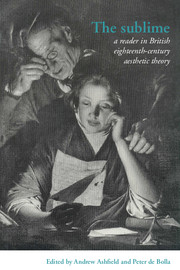Book contents
- Frontmatter
- Contents
- List of Abbreviations
- Introduction
- Part I The Longinian tradition
- Part II Rhapsody to rhetoric
- Part III Irish Perspectives
- Part IV The Aberdonian Enlightenment
- Part V Edinburgh and Glasgow
- Part VI From the Picturesque to the Political
- 41 A dissertation on oriental gardening (1772)
- 42 An essay on the picturesque (1794)
- 43 A review of The landscape (1795)
- 44 The history of the life of William Pitt, Earl of Chatham (1783)
- 45 Enquiry concerning political justice (1798)
- 46 Reflections on the revolution in France (1790)
- 47 A letter from the right honourable Edmund Burke to a noble lord (1796)
- 48 A vindication of the rights of man (1790)
- 49 Letters written in France (1790)
- 50 A tour in Switzerland (1798)
- Sources and further reading
49 - Letters written in France (1790)
Published online by Cambridge University Press: 05 June 2012
- Frontmatter
- Contents
- List of Abbreviations
- Introduction
- Part I The Longinian tradition
- Part II Rhapsody to rhetoric
- Part III Irish Perspectives
- Part IV The Aberdonian Enlightenment
- Part V Edinburgh and Glasgow
- Part VI From the Picturesque to the Political
- 41 A dissertation on oriental gardening (1772)
- 42 An essay on the picturesque (1794)
- 43 A review of The landscape (1795)
- 44 The history of the life of William Pitt, Earl of Chatham (1783)
- 45 Enquiry concerning political justice (1798)
- 46 Reflections on the revolution in France (1790)
- 47 A letter from the right honourable Edmund Burke to a noble lord (1796)
- 48 A vindication of the rights of man (1790)
- 49 Letters written in France (1790)
- 50 A tour in Switzerland (1798)
- Sources and further reading
Summary
Letter II
I promised to send you a description of the federation: but it is not to be described! One must have been present, to form any judgment of a scene, the sublimity of which depended much less on its external magnificence than on the effect it produced on the minds of the spectators. “The people, sure, the people were the sight!” I may tell you of pavillions, of triumphal arches, of altars on which incense was burnt, of two hundred thousand men walking in procession; but how am I to give you an adequate idea of the behaviour of the spectators? How am I to paint the impetuous feelings of that immense, that exulting multitude? Half a million of people assembled at a spectacle, which furnished every image that can elevate the mind of man; which connected the enthusiasm of moral sentiment with the solemn pomp of religious ceremonies; which addressed itself at once to the imagination, the understanding, and the heart!…
You will not suspect that I was an indifferent witness of such a scene. Oh no! this was not a time in which the distinctions of country were remembered. It was the triumph of human kind; it was man asserting the noblest privileges of his nature; and it required but the common feelings of humanity to become in that moment a citizen of the world. For myself, I acknowledge that my heart caught with enthusiasm the general sympathy; my eyes were filled with tears; and I shall never forget the sensations of that day, “while memory holds her seat in my bosom.”…
- Type
- Chapter
- Information
- The SublimeA Reader in British Eighteenth-Century Aesthetic Theory, pp. 300 - 302Publisher: Cambridge University PressPrint publication year: 1996



